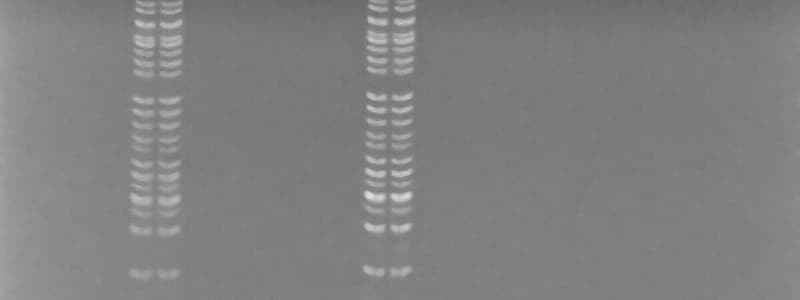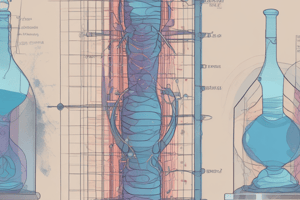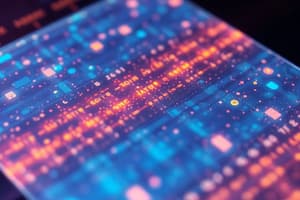Podcast
Questions and Answers
What is the primary factor that SDS-PAGE uses to separate proteins?
What is the primary factor that SDS-PAGE uses to separate proteins?
- Molecular weight of the proteins (correct)
- Shape of the proteins
- Charge of the proteins
- Concentration of the buffer
Which of the following factors does NOT affect electrophoresis?
Which of the following factors does NOT affect electrophoresis?
- pH and ionic strength of buffer
- Electric field strength
- Size and shape of the molecules
- Color of the proteins (correct)
What is the purpose of Sodium Dodecyl Sulfate (SDS) in SDS-PAGE?
What is the purpose of Sodium Dodecyl Sulfate (SDS) in SDS-PAGE?
- To alter the pH of the buffer
- To increase the temperature of the gel
- To denature proteins and provide a uniform charge (correct)
- To enhance the staining of proteins
Which technique involves the use of filter paper for separation of small charged molecules?
Which technique involves the use of filter paper for separation of small charged molecules?
During electrophoresis, molecules migrate towards which pole based on their charge?
During electrophoresis, molecules migrate towards which pole based on their charge?
What primarily affects the rate of migration of proteins in SDS-PAGE?
What primarily affects the rate of migration of proteins in SDS-PAGE?
What is the effect of temperature on electrophoresis?
What is the effect of temperature on electrophoresis?
Which statement about the results obtained from paper electrophoresis is accurate?
Which statement about the results obtained from paper electrophoresis is accurate?
What is the primary purpose of Southern blotting in molecular biology?
What is the primary purpose of Southern blotting in molecular biology?
What is the first step in the Southern blotting process?
What is the first step in the Southern blotting process?
Which component is crucial for the visualization of ethidium bromide during electrophoresis?
Which component is crucial for the visualization of ethidium bromide during electrophoresis?
In Northern blotting, what type of molecules are detected?
In Northern blotting, what type of molecules are detected?
Which step in Northern blotting follows the separation of RNA according to size?
Which step in Northern blotting follows the separation of RNA according to size?
What is the function of the labeled probe in a Southern blot?
What is the function of the labeled probe in a Southern blot?
What technique is used to separate the RNA in a Northern blot before its transfer to a solid support?
What technique is used to separate the RNA in a Northern blot before its transfer to a solid support?
During the Southern blotting process, which method is employed to visualize the bands of DNA after hybridization?
During the Southern blotting process, which method is employed to visualize the bands of DNA after hybridization?
What is the primary purpose of including bromophenol blue in the loading buffer?
What is the primary purpose of including bromophenol blue in the loading buffer?
When running an electrophoresis gel, where does DNA migrate towards?
When running an electrophoresis gel, where does DNA migrate towards?
What is the significance of including a DNA ladder on the gel?
What is the significance of including a DNA ladder on the gel?
What occurs when the power supply is turned on during gel electrophoresis?
What occurs when the power supply is turned on during gel electrophoresis?
How can ethidium bromide facilitate the visualization of DNA on a gel?
How can ethidium bromide facilitate the visualization of DNA on a gel?
What is a critical safety precaution when working with ethidium bromide?
What is a critical safety precaution when working with ethidium bromide?
What size of DNA does bromophenol blue migrate at approximately the same rate as?
What size of DNA does bromophenol blue migrate at approximately the same rate as?
What is the purpose of allowing the gel to destain in water after staining?
What is the purpose of allowing the gel to destain in water after staining?
What is the role of N,N’-methylene-bis-acrylamide in the formation of polyacrylamide gel?
What is the role of N,N’-methylene-bis-acrylamide in the formation of polyacrylamide gel?
What initiates the polymerization process in the formation of polyacrylamide gel?
What initiates the polymerization process in the formation of polyacrylamide gel?
Which component is NOT included in the de-staining buffer for polyacrylamide gel?
Which component is NOT included in the de-staining buffer for polyacrylamide gel?
How does the size of DNA fragments affect their migration rate in an agarose gel?
How does the size of DNA fragments affect their migration rate in an agarose gel?
What is the purpose of the 6X sample loading buffer when preparing DNA samples?
What is the purpose of the 6X sample loading buffer when preparing DNA samples?
What charge does DNA carry, and how does this affect its movement in an electrical field?
What charge does DNA carry, and how does this affect its movement in an electrical field?
What is a critical factor that can affect how fast DNA migrates through an agarose gel?
What is a critical factor that can affect how fast DNA migrates through an agarose gel?
Which of the following correctly describes the relationship between DNA size and migration in gel electrophoresis?
Which of the following correctly describes the relationship between DNA size and migration in gel electrophoresis?
Flashcards
Polyacrylamide gel
Polyacrylamide gel
A gel matrix formed by the polymerization of acrylamide and bis-acrylamide, used to separate proteins based on their size.
Ammonium persulfate
Ammonium persulfate
A chemical that initiates the polymerization of acrylamide and bis-acrylamide, creating the polyacrylamide gel.
TEMED (Tetramethylethylenediamine)
TEMED (Tetramethylethylenediamine)
A catalyst that accelerates the polymerization reaction of the polyacrylamide gel.
Agarose gel electrophoresis
Agarose gel electrophoresis
Signup and view all the flashcards
Electrophoresis
Electrophoresis
Signup and view all the flashcards
DNA charge
DNA charge
Signup and view all the flashcards
Agarose gel density
Agarose gel density
Signup and view all the flashcards
DNA fragment size
DNA fragment size
Signup and view all the flashcards
Factors Affecting Electrophoresis
Factors Affecting Electrophoresis
Signup and view all the flashcards
Paper Electrophoresis
Paper Electrophoresis
Signup and view all the flashcards
SDS-PAGE
SDS-PAGE
Signup and view all the flashcards
Sodium Dodecyl Sulphate (SDS)
Sodium Dodecyl Sulphate (SDS)
Signup and view all the flashcards
Protein Migration in SDS-PAGE
Protein Migration in SDS-PAGE
Signup and view all the flashcards
Sieving Effect in SDS-PAGE
Sieving Effect in SDS-PAGE
Signup and view all the flashcards
SDS Binding and Protein Size
SDS Binding and Protein Size
Signup and view all the flashcards
Southern Blotting
Southern Blotting
Signup and view all the flashcards
DNA Digestion
DNA Digestion
Signup and view all the flashcards
Gel Electrophoresis
Gel Electrophoresis
Signup and view all the flashcards
DNA Transfer
DNA Transfer
Signup and view all the flashcards
Probe Hybridization
Probe Hybridization
Signup and view all the flashcards
Northern Blotting
Northern Blotting
Signup and view all the flashcards
RNA Size Separation
RNA Size Separation
Signup and view all the flashcards
RNA Hybridization
RNA Hybridization
Signup and view all the flashcards
Bromophenol Blue
Bromophenol Blue
Signup and view all the flashcards
Glycerol in Loading buffer
Glycerol in Loading buffer
Signup and view all the flashcards
Sample
Sample
Signup and view all the flashcards
DNA Ladder
DNA Ladder
Signup and view all the flashcards
Anode
Anode
Signup and view all the flashcards
Ethidium Bromide
Ethidium Bromide
Signup and view all the flashcards
Destaining
Destaining
Signup and view all the flashcards
Study Notes
Biomedical Techniques CLSB-222
- Course instructor: Dr. Ahmad Alamri, M.H.S, Ph.D.
- Instructor contact: [email protected]
Electrophoretic Techniques
- Electrophoresis is the migration of charged molecules in an electric field.
- It's commonly used in clinical labs for isolating and quantifying serum proteins, isoenzymes, hemoglobin, and lipoproteins.
- Factors affecting electrophoresis include the net electric charge on molecules (pH and ionic strength of buffer), size and shape of molecules, electric field strength, and the nature of the supporting media, and temperature of operation.
A) Paper Electrophoresis
- A form of electrophoresis performed on filter paper.
- Useful for separating small charged molecules like amino acids and small proteins.
- Samples are spotted, and a high voltage is applied, separating molecules based on charge.
- Separated components are detected by staining methods based on their chemical identity.
B) SDS-Polyacrylamide Gel Electrophoresis (SDS-PAGE)
- A widely used technique in biochemistry, forensics, genetics, and molecular biology for separating proteins.
- Primarily separates proteins based on their molecular weights.
- SDS (Sodium Dodecyl Sulfate) denatures proteins, binds to hydrophobic regions, disrupting non-covalent bonds, and giving proteins a negative net charge.
- Proteins then migrate through the gel based on their size, with smaller proteins moving faster.
- The rate of migration during SDS-PAGE is determined by the molecular weight.
Polyacrylamide Gel
- Formed by co-polymerization of acrylamide and N,N'-methylene-bis-acrylamide.
- Polymerization requires ammonium persulfate and tetramethylene ethylene diamine (TEMED) as catalysts.
Staining the Gel
- Staining the gel involves using a buffer containing glacial acetic acid, methanol, and Coomassie brilliant blue 250-R.
- Destaining the gel uses a buffer containing glacial acetic acid and methanol to remove excess stain.
- Ethidium bromide stains DNA, allowing visualization under UV light. Caution: Ethidium bromide is a powerful mutagen and is moderately toxic.
C) Agarose Gel Electrophoresis
- Used to separate DNA fragments based on their size using a gel made of agarose.
- Separates DNA by their rate of movement through the gel in an electric field.
- Commonly used to determine the presence and size of PCR products.
Sample Preparation
- Mix DNA samples with 6X sample loading buffer containing bromophenol blue (for color) and glycerol (for weight).
- This improves visibility during loading and increases sample density for better placement in the gel wells.
Loading the Gel
- Carefully place the pipette tip over a well and gently expel the sample.
- The sample should sink into the well, avoiding puncturing the gel with the tip.
Running the Gel
- Place the cover on the electrophoresis chamber, connecting the electrical leads to the power supply.
- Ensure the leads are correctly attached (DNA migrates towards the anode, red).
DNA Ladder Standard
- A DNA ladder containing DNA fragments of known sizes is included on the gel.
- This allows for easier determination of unknown DNA sizes.
- Bromophenol blue runs at approximately the same rate as a 300 bp DNA molecule.
Southern Blotting
- Method for detecting specific DNA sequences in DNA samples.
- Digests genomic DNA with restriction enzymes.
- Separates DNA fragments by agarose gel electrophoresis.
- Denatures DNA fragments.
- Transfers DNA to a solid support (nylon or nitrocellulose).
- Hybridizes immobilized DNA to a labeled probe.
- Detects complementary probes (e.g., by autoradiography).
- Estimates the size and number of bands after digestion.
F) Northern Blotting
- Method routinely used for detecting specific RNA sequences in RNA samples.
- Isolates intact mRNA.
- Separates RNA by size (using denaturing agarose gel).
- Transfers RNA to a solid support.
- Fixes RNA to the solid matrix.
- Hybridizes with complementary probes.
- Removes unbound probe molecules.
- Detects, captures, and analyzes images of specifically bound probe molecules.
F) Western Blotting
- "Immunoblotting" is a technique for determining the molecular weight and quantity of proteins in a complex mixture; it is also used in medical diagnostics.
- Separates proteins by SDS-PAGE (polyacrylamide gel electrophoresis).
- Transfers proteins to a membrane (e.g., nitrocellulose).
- Uses primary and secondary antibodies to detect target proteins.
- Detects target proteins using colorimetric or chemiluminescent probes.
Studying That Suits You
Use AI to generate personalized quizzes and flashcards to suit your learning preferences.
Related Documents
Description
Test your knowledge on key molecular biology techniques, including SDS-PAGE, Southern blotting, and Northern blotting. Answer questions regarding the principles and purposes of these techniques as well as the factors affecting protein and nucleic acid separation. This quiz covers essential concepts and methods used in the laboratory.




